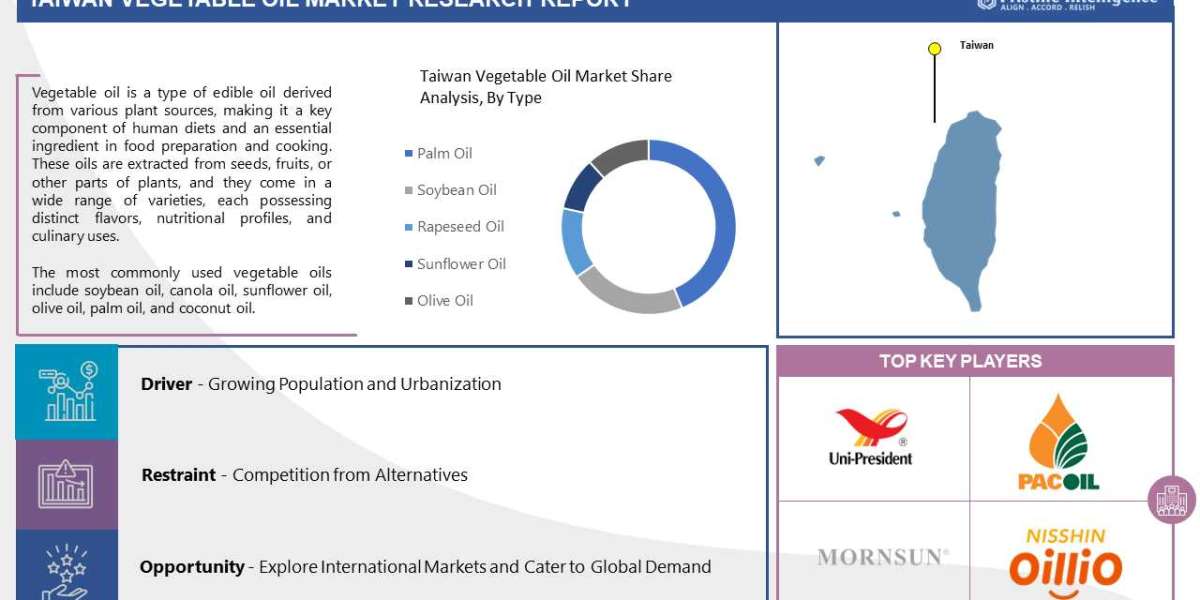vegetable oils have widespread applications in the food industry, serving as ingredients in baked goods, processed foods, salad dressings, margarine, and various snacks. Additionally, they are also used in non-food sectors, such as cosmetics, and personal care products, and industrial uses like biodiesel production. Due to their versatility, availability, and nutritional benefits, vegetable oils play a crucial role in global food systems and remain an indispensable part of modern-day diets.
Taiwan Vegetable oil is a type of edible oil derived from various plant sources, such as seeds, nuts, fruits, or vegetables. It plays a crucial role in cooking, baking, and food preparation worldwide. The extraction process typically involves crushing or pressing the plant's seeds or fruits to obtain the oil, which is then refined to remove impurities. Vegetable oils are rich in essential fatty acids, like omega-3 and omega-6, and they provide a significant source of energy and nutrients in the human diet. The Taiwan Vegetable Oil Market size was reasonably estimated to be approximately 26.56 Million Metric Ton in 2023 and is poised to consume over 38.94 Million Metric Ton by the end of 2030, projecting a CAGR of around 4.9% from 2023 to 2030.
Growing awareness regarding the health benefits of vegetable oils compared to animal fats is a significant driver. Consumers are increasingly opting for healthier dietary choices, propelling the demand for vegetable oils. Additionally, the expanding food industry, particularly in emerging economies, fuels market growth as vegetable oils are widely used in food processing and cooking. Moreover, the versatility of vegetable oils in various applications such as cosmetics, biofuels, and pharmaceuticals create new opportunities for market expansion. Technological advancements in extraction methods and sustainable production practices further enhance market prospects by improving efficiency and reducing environmental impact. However, the vegetable oil market faces restraints such as fluctuating prices of raw materials, which can impact profit margins for manufacturers. Environmental concerns related to deforestation and habitat destruction associated with palm oil production pose challenges, leading to regulatory pressures and consumer backlash in some regions.
The rising concerns about health and environmental sustainability, consumers are seeking organic alternatives to conventional vegetable oils. This trend is further fueled by the availability of a variety of organic vegetable oils and the expansion of distribution channels, making organic options more accessible to consumers across different demographics. Increased awareness of health benefits associated with sunflower oil, such as its high content of unsaturated fats and vitamin E, is driving consumer preferences. Additionally, the versatility of sunflower oil in cooking applications, its relatively lower cost compared to other oils, and a growing trend towards healthier lifestyles are all contributing to its expanding market share in Taiwan.
Get Full PDF Sample Copy of Report https://pristineintelligence.com/request-sample/taiwan-vegetable-oil-market-190
The vegetable oil market in Taiwan has evolved over the years, influenced by changing dietary preferences, economic growth, and advancements in food processing technologies. The country imports a significant portion of its vegetable oil needs due to limited domestic production capacity.The vegetable oil market in Taiwan is a significant segment of the country's food industry, driven by both domestic consumption and industrial use. The market encompasses a variety of vegetable oils, including soybean oil, palm oil, sunflower oil, canola oil, and olive oil, among others. These oils are used in cooking, food processing, and other applications such as cosmetics and biodiesel production.
Top Key Players:
"Uni-President Enterprises Corp. (Taiwan), Lih Yann Co. Ltd. (Taiwan), Nisshin Oillio Group Ltd. (Japan), Farmtop Biotech Co. Ltd. (Taiwan), Sheng Chang Oil Mills Co.Ltd. (Taiwan), Morn Sun Feed Corporation (Taiwan), Pacific Oil Mills (Taiwan), Taiwan Edible Oil Co. Ltd. (Taiwan), Thye Huat Chan Oil Mills Sdn Bhd (Malaysia), Daimond Grain Tech Co. Ltd. (Taiwan), Linyi Fuchun Food Co. Ltd. (China), Rich Oil Enterprise Co. Ltd. (Taiwan), Yihai Kerry Group (Taiwan) (Taiwan), Lian Hwa Foods Corporation (Taiwan) and Other Major Players"
Types of Vegetable Oils in the Taiwanese Market
Soybean Oil:
- Usage: Widely used for cooking, frying, and as an ingredient in processed foods.
- Source: Predominantly imported from countries like the United States and Brazil.
Palm Oil:
- Usage: Commonly used in food processing, especially in the production of snacks, baked goods, and margarine.
- Source: Imported mainly from Malaysia and Indonesia.
Sunflower Oil:
- Usage: Popular for its light flavor and high smoke point, used in salads and frying.
- Source: Imported from countries like Ukraine and Argentina.
Canola Oil:
- Usage: Known for its health benefits due to low saturated fat content, used in cooking and food processing.
- Source: Imported from Canada and Australia.
Olive Oil:
- Usage: Preferred for its flavor and health benefits, used in salads, dressings, and Mediterranean cuisine.
- Source: Imported from Mediterranean countries such as Spain, Italy, and Greece.
3. Market Dynamics
Consumption Patterns:
- The consumption of vegetable oils in Taiwan is influenced by dietary trends, with an increasing preference for healthier oils such as olive and canola oil.
- The food service industry, including restaurants and fast-food chains, is a significant consumer of vegetable oils.
Import Trends:
- Taiwan imports a large proportion of its vegetable oil, with major suppliers being the United States, Malaysia, Indonesia, and European countries.
- Trade policies, import tariffs, and global supply chain dynamics affect the availability and prices of vegetable oils.
Industrial Use:
- Besides culinary uses, vegetable oils are used in the manufacturing of biodiesel, cosmetics, and personal care products.
- The demand for biofuels has been a growing segment, driven by environmental policies and the push for renewable energy sources.
4. Key Players in the Taiwanese Vegetable Oil Market
Domestic Producers:
- Local companies produce refined oils from imported crude oils and also engage in packaging and distribution.
International Brands:
- Well-known global brands such as Cargill, Bunge, and Wilmar have a presence in the Taiwanese market, supplying various types of vegetable oils.
Retail Chains and Distributors:
- Major supermarkets and retail chains like Carrefour, RT-Mart, and Pxmart are key distribution channels for vegetable oils.
- Specialty stores and online platforms also contribute to the market, catering to niche segments and health-conscious consumers.
5. Benefits of Vegetable Oils
Nutritional Benefits:
- Rich in essential fatty acids, vitamins, and antioxidants.
- Different oils offer various health benefits, such as lowering cholesterol levels, improving heart health, and providing essential nutrients.
Culinary Versatility:
- Suitable for a wide range of cooking methods, including frying, baking, and salad dressings.
- Enhances the flavor and texture of food.
Economic Importance:
- Supports the food processing industry, contributing to economic growth and employment.
- Essential for the production of biodiesel, contributing to energy sustainability.
6. Challenges in the Vegetable Oil Market
Health Concerns:
- High consumption of certain oils, such as palm oil, has been linked to health issues due to high saturated fat content.
- Ongoing debates about the health implications of various types of vegetable oils.
Sustainability Issues:
- Environmental concerns related to the cultivation of oil crops, especially palm oil, which is associated with deforestation and habitat destruction.
- The need for sustainable sourcing and certification to address environmental impact.
Market Competition:
- Intense competition from both domestic and international brands, leading to price fluctuations.
- The need for differentiation through quality, health benefits, and sustainable practices.
Regulatory Challenges:
- Compliance with food safety standards and import regulations.
- Changing trade policies and tariffs impacting the import of vegetable oils.
7. Future Outlook for the Vegetable Oil Market in Taiwan
Growth of Health-Conscious Consumption:
- Increasing demand for healthier oils, such as olive and canola oil, driven by rising health awareness.
- Potential for growth in niche markets, such as organic and non-GMO oils.
Technological Advancements:
- Innovations in oil extraction and refining technologies to improve quality and nutritional value.
- Development of new products and blends to meet diverse consumer preferences.
Sustainable Practices:
- Growing emphasis on sustainability, with consumers and businesses prioritizing environmentally friendly products.
- Adoption of certification programs such as RSPO (Roundtable on Sustainable Palm Oil) for sustainable sourcing.
If you require any specific information that is not covered currently within the scope of the report, we will provide the same as a part of the customization https://pristineintelligence.com/request-customization/taiwan-vegetable-oil-market-190
Market Expansion:
- Opportunities for market expansion through e-commerce and specialty stores.
- Increased collaboration between domestic producers and international suppliers to ensure a stable supply chain.
- The Taiwan vegetable oil market is a crucial component of the country's food industry. With a population of over 23 million, Taiwan is a significant consumer of edible oils, making the vegetable oil market a vital aspect of its food supply chain. The most commonly used vegetable oils in Taiwan include soybean oil, palm oil, canola oil, and sunflower oil.
- Taiwan's vegetable oil market is characterized by the presence of both domestic producers and imported products. The country's own vegetable oil production capacity is limited, leading to a reliance on imports to meet the growing demand. As a result, international trade plays a critical role in shaping the market dynamics, with countries like Malaysia and Indonesia being major suppliers.
- The market is influenced by factors such as changing consumer preferences, health consciousness, and economic conditions. The preference for healthier and more sustainable options has led to rising demand for cold-pressed, non-GMO, and organic vegetable oils. Additionally, the economic development and increasing disposable incomes of Taiwanese
Conclusion :
The vegetable oil market in Taiwan is a dynamic and essential part of the country's food industry. With diverse types of oils catering to different consumer needs, the market continues to evolve, driven by health trends, technological advancements, and sustainability concerns. Addressing challenges such as health implications, environmental impact, and market competition will be crucial for the continued growth and success of the vegetable oil market in Taiwan



